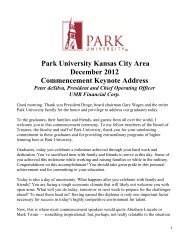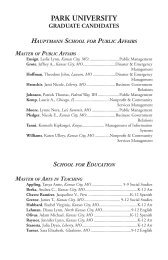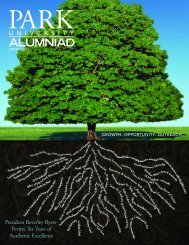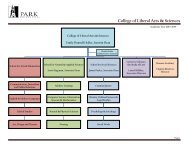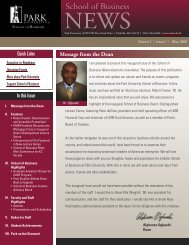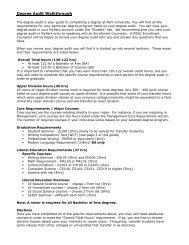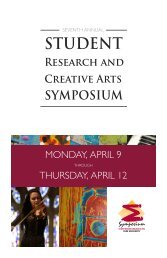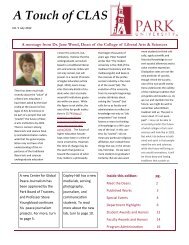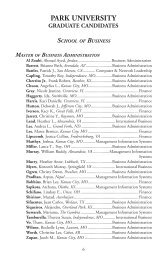How to Write a Radio Serial Drama for Social Development- PDF
How to Write a Radio Serial Drama for Social Development- PDF
How to Write a Radio Serial Drama for Social Development- PDF
You also want an ePaper? Increase the reach of your titles
YUMPU automatically turns print PDFs into web optimized ePapers that Google loves.
210 Glossary<br />
denouement<br />
development<br />
dialogue<br />
diffusion theory<br />
direc<strong>to</strong>r<br />
distance education<br />
distributed learning<br />
See resolution, below.<br />
The portion of the s<strong>to</strong>ry following the introduction during which the dramatic<br />
conflict develops and intensifies. (Chapter 3)<br />
The words that the characters utter in a drama. In radio drama, the dialogue<br />
must provide listeners with an understanding of location, personality, and action<br />
as well as the message. (Chapters 3 and 7)<br />
Communication theory that states that social networks and interpersonal<br />
communication are largely responsible <strong>for</strong> spreading new ideas and behaviors and<br />
<strong>for</strong> determining how people judge them. (Prologue)<br />
The person who directs the ac<strong>to</strong>rs and technicians in the studio recording of the<br />
serial. In some countries, the direc<strong>to</strong>r is called the producer. (Chapter 2)<br />
Education <strong>for</strong> students who cannot attend class because they live <strong>to</strong>o far from an<br />
institution of learning or <strong>for</strong> some other reason. Distance education can be<br />
provided by correspondence courses or through electronic media such as radio,<br />
television, and computers. (Chapter 2)<br />
The process of spreading learning throughout a radio serial, with particular<br />
attention <strong>to</strong> pace and repetition. (Chapter 2)<br />
drama A s<strong>to</strong>ry acted out on stage, radio, television, or film (Chapter 3)<br />
dramatic<br />
dramatic conflict<br />
efficacy<br />
Enter-Educate<br />
episode<br />
episode treatment<br />
event list<br />
flashback<br />
<strong>for</strong>mat<br />
Strongly effective <strong>to</strong> the point of exaggeration, <strong>for</strong> example, “There was a very<br />
dramatic moment in the s<strong>to</strong>ry when the king had <strong>to</strong> choose between his throne<br />
and his wife.” Also means related <strong>to</strong> drama, e.g., “The s<strong>to</strong>ry will be <strong>to</strong>ld as a<br />
dramatic presentation rather than as a novel.” (Chapter 3)<br />
The twists and turns and juxtapositions of life that are reflected in drama and<br />
provide its central interest as the audience becomes emotionally involved in why<br />
things happen and how they will turn out. (Chapter 3)<br />
Confidence in one’s ability <strong>to</strong> carry out a behavior. Grows with direct personal<br />
experience and with vicarious experience gained by observing real people or<br />
characters in a drama. (Prologue)<br />
A <strong>for</strong>mat that blends entertainment and education <strong>to</strong> disseminate social messages.<br />
The use of this term originated with Johns Hopkins University Population<br />
Communication Services. (Chapter 1)<br />
Individual programs in<strong>to</strong> which a serialized radio or television drama is divided,<br />
usually broadcast once a week. Also known as an installment, an episode of a<br />
radio drama is similar <strong>to</strong> a chapter in a book. (Chapter 3)<br />
Description of scene divisions, action, settings, personalities of characters, and<br />
emotions <strong>to</strong> be stressed in an episode as well as the point of suspense on which<br />
each scene and the episode itself will end. (Chapter 8)<br />
A list of the major events needed in the s<strong>to</strong>ry of an Enter-Educate drama <strong>to</strong> allow<br />
the message <strong>to</strong> be brought in naturally and subtly. (Chapter 4)<br />
A scene from a past time that interrupts the present action of a drama.<br />
(Chapter 6)<br />
The <strong>for</strong>m or design of a radio or television program; includes interview, talk,<br />
drama, and news shows. (Chapter 1)




